
Current Stem Cell Research & Therapy
Scope & Guideline
Pioneering Research for a Healthier Future
Introduction
Aims and Scopes
- Stem Cell Mechanisms and Pathways:
Research exploring the underlying biological mechanisms of stem cells, including signaling pathways, differentiation processes, and the effects of various factors on stem cell behavior. - Clinical Applications of Stem Cells:
Studies focusing on the therapeutic applications of stem cells in treating various diseases, including but not limited to neurodegenerative disorders, cardiovascular diseases, and autoimmune conditions. - Stem Cell Sources and Characteristics:
Investigations into different sources of stem cells, such as mesenchymal stem cells, induced pluripotent stem cells, and embryonic stem cells, along with their unique properties and potential therapeutic uses. - Exosomes and Secretome in Stem Cell Therapy:
Research on the role of stem cell-derived exosomes and secretome in mediating therapeutic effects, including their potential in tissue repair and regeneration. - Tissue Engineering and Regenerative Medicine:
Studies involving the integration of stem cells with biomaterials and scaffolds to enhance tissue regeneration and repair in various medical applications. - Safety and Efficacy of Stem Cell Therapies:
Meta-analyses and systematic reviews assessing the safety, efficacy, and long-term outcomes of stem cell therapies in clinical settings.
Trending and Emerging
- Exosome Research and Applications:
There is a growing trend in the exploration of exosomes derived from stem cells, focusing on their roles in intercellular communication and potential as therapeutic agents in regenerative medicine. - Combination Therapies Involving Stem Cells:
Recent publications emphasize the use of stem cells in combination with other therapeutic modalities, such as gene therapy, nanomaterials, and pharmacological agents, to enhance treatment outcomes. - Technological Advances in Stem Cell Research:
The integration of advanced technologies, such as CRISPR gene editing, bioinformatics, and 3D bioprinting, is increasingly being recognized for its potential to revolutionize stem cell applications and tissue engineering. - Personalized Medicine Approaches:
Emerging themes highlight the personalization of stem cell therapies based on patient-specific factors, including genetic and epigenetic profiles, to optimize treatment efficacy and safety. - Focus on Aging and Stem Cells:
Research addressing the implications of aging on stem cell function and the development of therapies targeting age-related diseases is gaining momentum, reflecting an increasing interest in geriatric medicine.
Declining or Waning
- Basic Science of Stem Cells:
While foundational research on stem cell biology remains important, there has been a noticeable decline in publications focused solely on basic science without direct clinical implications, as the field moves towards more applied research. - Non-Mesenchymal Stem Cell Applications:
Research centered on non-mesenchymal stem cells, such as hematopoietic stem cells or embryonic stem cells, has decreased, possibly due to the increased focus on mesenchymal stem cells and their therapeutic versatility. - In-vitro Studies Without Clinical Relevance:
There has been a reduction in the publication of purely in-vitro studies that do not translate into clinical applications, as the journal emphasizes studies that demonstrate clear potential for therapeutic use. - Single-source Stem Cell Studies:
Research focusing on single-source stem cells (e.g., only one type of stem cell) is less common, reflecting a shift towards comparative studies that assess multiple stem cell types and sources for broader therapeutic implications.
Similar Journals

Stem Cells Translational Medicine
Exploring New Frontiers in Translational MedicineStem Cells Translational Medicine, published by Oxford University Press, is a leading open-access journal that has been at the forefront of stem cell research since its launch in 2012. With an impressive impact across various categories, it occupies Q2 in Cell Biology and is highly recognized in Q1 for both Developmental Biology and Miscellaneous Medicine in 2023. Its strong Scopus rankings highlight its significance in the fields of Biochemistry, Genetics, and Molecular Biology, achieving an outstanding percentile ranking of 93rd in Developmental Biology. The journal provides a pivotal platform for researchers, professionals, and students to publish and access cutting-edge findings that contribute to the understanding and application of stem cell technology. With a commitment to disseminating high-quality scientific knowledge, Stem Cells Translational Medicine plays a vital role in advancing research and innovation within the rapidly evolving landscape of regenerative medicine.

Tissue Engineering and Regenerative Medicine
Elevating the Science of Tissue Engineering and RegenerationTissue Engineering and Regenerative Medicine, published by the Korean Tissue Engineering Regenerative Medicine Society, is a distinguished journal focusing on the interdisciplinary fields of tissue engineering, regenerative medicine, and related biomedical innovations. With an ISSN of 1738-2696 and an E-ISSN of 2212-5469, this journal disseminates cutting-edge research and advancements pivotal to developing therapeutic strategies that improve tissue function and repair. As a testament to its scholarly impact, it holds a Q2 ranking in both Biomedical Engineering and Medicine (miscellaneous) categories, reflecting its influence and relevance within the scientific community, particularly with a Scopus rank placing it in the 82nd percentile among similar journals. Although the journal does not offer open access, it provides vital insights and knowledge to researchers, professionals, and students involved in the quest for innovative solutions in medical science and engineering. With its convergence years extending from 2008 to 2024, the journal continues to be an essential platform for the dissemination of high-quality research that drives the field forward.
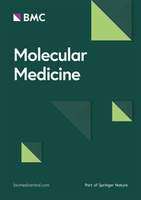
MOLECULAR MEDICINE
Bridging Research and Practice in Molecular MedicineMOLECULAR MEDICINE, published by SPRINGER, is a leading scholarly journal dedicated to advancing the fields of genetics and molecular biology with a focus on clinical applications. Since its inception in 1994, it has evolved to become a pivotal platform for disseminating innovative research findings, achieving a remarkable Q1 ranking in multiple categories, including Genetics, Molecular Biology, and Molecular Medicine as of 2023. Featuring an Open Access model since 2000, the journal ensures that cutting-edge research is freely available to the global scientific community, facilitating collaboration and knowledge exchange. With a commitment to high-quality peer-reviewed content, MOLECULAR MEDICINE serves as an essential resource for researchers, healthcare professionals, and students seeking to stay at the forefront of molecular research and its implications for medical science. For those interested in contributing to or accessing vital research in this dynamic field, MOLECULAR MEDICINE stands out as a premier choice.

STEM CELLS
Unveiling the potential of stem cell science.STEM CELLS, published by Oxford University Press, is a leading academic journal dedicated to advancing the field of cell and developmental biology. With an impressive impact factor and ranking in the Q1 and Q2 quartiles across various disciplines, including Developmental Biology and Molecular Medicine, this journal serves as a critical platform for disseminating cutting-edge research findings from 1981 to the present. The journal's rigorous peer-review process ensures the highest quality of published content, making it an essential resource for researchers, healthcare professionals, and students interested in the latest breakthroughs in stem cell research and its applications. With a focus on innovative methodologies and holistic perspectives, STEM CELLS not only highlights significant discoveries but also fosters a collaborative exchange of ideas, driving forward the frontiers of science in regenerative medicine and developmental studies.
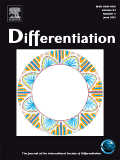
DIFFERENTIATION
Illuminating the Pathways of Molecular ProcessesDIFFERENTIATION is a respected peer-reviewed journal published by Elsevier Science Ltd, dedicated to advancing knowledge in the fields of Cancer Research, Cell Biology, Developmental Biology, and Molecular Biology. With an established history since 1973, the journal continuously explores the intricacies of cellular and molecular processes that govern differentiation in biological systems, thus playing a pivotal role in shaping contemporary research directions. Currently indexed in the Q3 quartile across multiple relevant categories, it provides a crucial platform for researchers to disseminate their findings and engage with the scientific community. DIFFERENTIATION does not offer open access, but it remains a valuable resource for academics seeking to enhance their understanding of the fundamental mechanisms that underpin life sciences. By fostering a rigorous dialogue among scientists, it contributes significantly to the ever-evolving landscape of biochemistry and genetics.
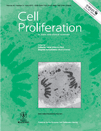
CELL PROLIFERATION
Shaping the Future of Medicine Through Cellular InsightsCELL PROLIFERATION, published by Wiley, is a leading open-access journal that has been at the forefront of research since its inception in 1968. With an impact factor that solidifies its position in the Q1 category of both Cell Biology and Medicine (Miscellaneous), this journal serves as a premier platform for disseminating groundbreaking studies in the field of cellular and molecular biology. The journal is renowned for its rigorous peer-review process and comprehensive coverage of topics related to cell growth, division, and differentiation, making it an invaluable resource for researchers, professionals, and students alike. With its notable Scopus ranking of #30 in Biochemistry, Genetics, and Molecular Biology: Cell Biology, and a robust open access model since 2019, CELL PROLIFERATION ensures that cutting-edge research is accessible to a global audience, fostering collaboration and innovation across the scientific community. Located in the United Kingdom, the journal remains committed to enhancing the understanding of cellular processes, thereby influencing developments in medicine and biotechnology.
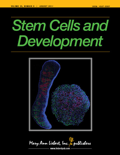
STEM CELLS AND DEVELOPMENT
Advancing the Frontiers of Stem Cell ResearchSTEM CELLS AND DEVELOPMENT, published by Mary Ann Liebert, Inc., is a leading peer-reviewed journal dedicated to the rapidly advancing fields of stem cell biology and developmental science. With an ISSN of 1547-3287 and an E-ISSN of 1557-8534, the journal encompasses a broad range of topics central to understanding stem cells' roles in development and regeneration processes. It holds a prestigious standing within its category quartiles, ranking Q3 in Cell Biology, Q2 in Developmental Biology, and Q2 in Hematology for 2023. With its convergence from 2004 to 2024, STEM CELLS AND DEVELOPMENT fosters an innovative platform for researchers, professionals, and students to disseminate groundbreaking research, share insights, and explore novel therapeutic approaches. Open access options enhance the journal's visibility and accessibility, promoting a collaborative exchange of information among the scientific community. Positioned at the forefront of stem cell research and its applications, this journal is vital for anyone seeking to stay informed about the latest advancements and trends within these critical areas of study.
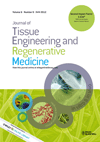
Journal of Tissue Engineering and Regenerative Medicine
Exploring breakthroughs in biomaterials and regenerative therapies.Journal of Tissue Engineering and Regenerative Medicine, published by WILEY, stands as a pivotal platform in the fields of biomaterials, biomedical engineering, and regenerative medicine. With an ISSN of 1932-6254 and an E-ISSN of 1932-7005, this journal, based in the United Kingdom, has consistently delivered high-quality research since its inception in 2006, converging critical insights through 2024. With an impressive citation profile reflected in its Scopus rankings—specifically a rank of #58 in Medicine and #75 in Biomedical Engineering—the journal is acknowledged for its substantial impact, as demonstrated by its competitive quartile standings in 2023. Notably, it maintains a Q3 ranking in Biomaterials and Q2 in both Biomedical Engineering and Medicine (miscellaneous), showcasing its influence and relevance in the rapidly evolving interplay between engineering and medicine. The journal serves as a vital resource for researchers and practitioners aiming to stay abreast of innovations and breakthroughs in regenerative therapies, tissue scaffolds, and biomaterials. While not an open-access publication, it fosters academic dialogue and knowledge dissemination that is crucial for advancing the field.

IN VITRO CELLULAR & DEVELOPMENTAL BIOLOGY-ANIMAL
Pioneering Research in Developmental BiologyIN VITRO CELLULAR & DEVELOPMENTAL BIOLOGY-ANIMAL, published by SPRINGER, is a pivotal journal in the fields of cell biology and developmental biology, focusing on in vitro studies that enhance our understanding of animal cellular mechanisms and development. With an ISSN of 1071-2690 and an E-ISSN of 1543-706X, this esteemed journal offers a platform for researchers to present their findings and contribute to the body of knowledge necessary for advancements in biological sciences. As a recognized publication, it holds a 2023 category quartile of Q4 in Cell Biology and Developmental Biology, and Q3 in miscellaneous Medicine, reflecting its competitive position yet inviting critical submissions that can span multidisciplinary approaches. Though currently not open access, it serves as an essential resource for professionals, researchers, and students dedicated to unraveling the complexities of cellular processes in an ever-evolving field. The journal has been continuously published since 1986, signifying its long-standing commitment to fostering scientific discourse and innovation.
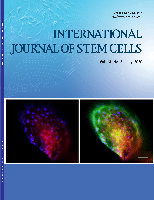
International Journal of Stem Cells
Unlocking the Potential of Cell BiologyThe International Journal of Stem Cells is a distinguished peer-reviewed journal dedicated to advancing the field of stem cell research. Published by the Korean Society for Stem Cell Research, this journal has established itself as a vital source of high-quality research since its inception in 2008. Operating under the ISSN 2005-3606 and E-ISSN 2005-5447, the journal caters to a global audience, featuring works that span a diverse array of topics within Cell Biology and Developmental Biology. It is noteworthy that as of 2023, the journal is ranked Q3 in Cell Biology and Q2 in Developmental Biology, highlighting its growing influence and credibility in the scientific community. Given its commitment to facilitating open scientific communication, it is crucial for researchers, professionals, and students to engage with the rigorous research published in this journal as it profoundly impacts the understanding and application of stem cell science. With accessibility to a wealth of innovative studies, the International Journal of Stem Cells remains an indispensable resource for anyone interested in the transformative potential of stem cell research.